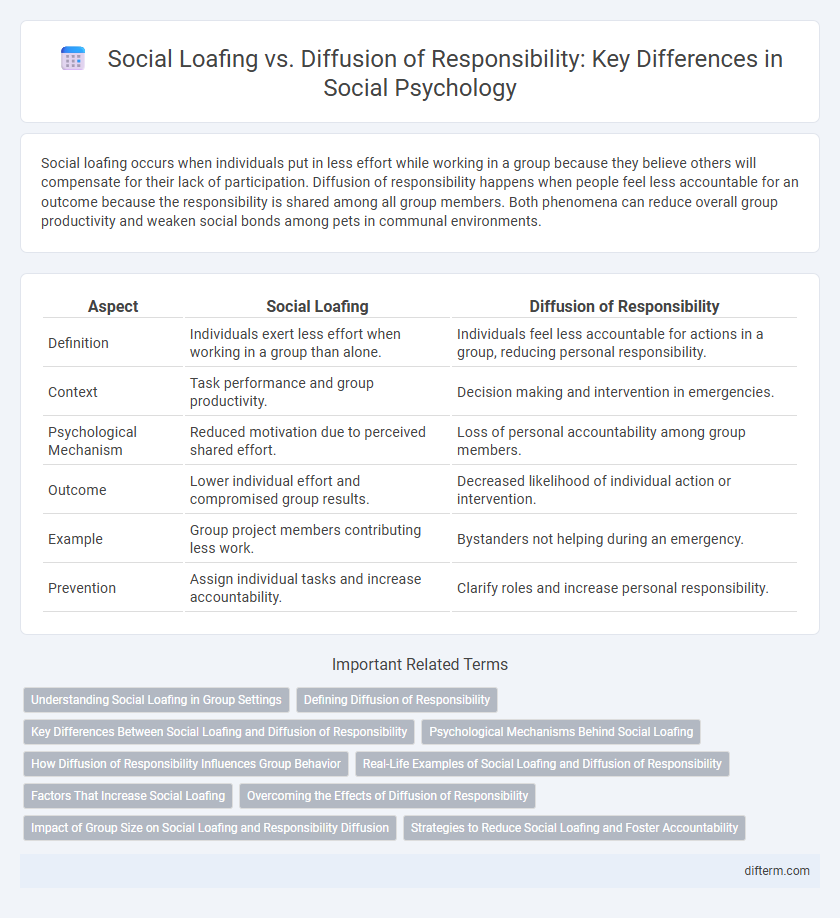Social loafing occurs when individuals put in less effort while working in a group because they believe others will compensate for their lack of participation. Diffusion of responsibility happens when people feel less accountable for an outcome because the responsibility is shared among all group members. Both phenomena can reduce overall group productivity and weaken social bonds among pets in communal environments.
Table of Comparison
| Aspect | Social Loafing | Diffusion of Responsibility |
|---|---|---|
| Definition | Individuals exert less effort when working in a group than alone. | Individuals feel less accountable for actions in a group, reducing personal responsibility. |
| Context | Task performance and group productivity. | Decision making and intervention in emergencies. |
| Psychological Mechanism | Reduced motivation due to perceived shared effort. | Loss of personal accountability among group members. |
| Outcome | Lower individual effort and compromised group results. | Decreased likelihood of individual action or intervention. |
| Example | Group project members contributing less work. | Bystanders not helping during an emergency. |
| Prevention | Assign individual tasks and increase accountability. | Clarify roles and increase personal responsibility. |
Understanding Social Loafing in Group Settings
Social loafing occurs when individual effort decreases as group size increases, leading to reduced productivity in collaborative tasks. This phenomenon contrasts with diffusion of responsibility, where individuals feel less accountable for outcomes because responsibility is shared among members. Understanding social loafing involves recognizing factors such as lack of individual evaluation, task importance, and group cohesion that influence members' motivation to contribute actively.
Defining Diffusion of Responsibility
Diffusion of responsibility refers to the psychological phenomenon where individuals are less likely to take action or feel accountable when others are present, often leading to decreased helping behavior in group settings. This concept explains why people might remain passive in emergencies or collective tasks, assuming others will intervene. Unlike social loafing, which involves reduced effort in group work due to unclear individual accountability, diffusion of responsibility specifically highlights the diminished sense of personal obligation when responsibility is perceived to be shared.
Key Differences Between Social Loafing and Diffusion of Responsibility
Social loafing occurs when individuals exert less effort in a group task due to reduced accountability, whereas diffusion of responsibility involves a diminished sense of personal obligation to act in emergencies because responsibility is spread across all group members. Social loafing primarily affects performance outcomes in cooperative tasks, while diffusion of responsibility influences bystander intervention in critical situations. Understanding these distinctions is crucial for designing strategies that enhance individual accountability and encourage proactive behavior in group settings.
Psychological Mechanisms Behind Social Loafing
Social loafing occurs when individuals exert less effort in a group due to reduced personal accountability and the perception that others will pick up the slack. This behavior arises from a psychological mechanism where the diffusion of responsibility decreases motivation, as individuals feel less identifiable and less evaluated within the collective. Understanding this mechanism helps explain why group performance often declines when individual contributions are not distinctly recognized.
How Diffusion of Responsibility Influences Group Behavior
Diffusion of responsibility reduces individual accountability in group settings, leading members to feel less compelled to act or contribute. This psychological phenomenon often causes decreased motivation and participation, as the presence of others creates ambiguity about who should take initiative. Consequently, group performance can suffer when tasks are perceived as shared responsibilities without clear individual roles.
Real-Life Examples of Social Loafing and Diffusion of Responsibility
In group projects at work, social loafing often occurs when some team members contribute less effort, relying on others to complete tasks, as seen in underperforming committees or study groups. Diffusion of responsibility is evident during emergencies, such as bystander apathy in public settings where individuals assume someone else will take action, leading to delayed or absent help. Both phenomena highlight how group dynamics can diminish individual accountability and proactive behavior in social environments.
Factors That Increase Social Loafing
Anonymity and lack of individual accountability significantly increase social loafing in group settings, as individuals feel less pressure to contribute when their efforts are not directly identifiable. Large group sizes dilute personal responsibility, making it easier for members to reduce effort without detection. Moreover, low task importance or perceived dispensability of individual input further exacerbate social loafing behaviors.
Overcoming the Effects of Diffusion of Responsibility
Overcoming the effects of diffusion of responsibility requires increasing individual accountability within group settings by clearly defining roles and expectations. Implementing structured group tasks and promoting personal investment through public commitment reduces the likelihood of social loafing. Research shows that direct encouragement and immediate feedback enhance motivation, ensuring each member feels responsible for the group's outcome.
Impact of Group Size on Social Loafing and Responsibility Diffusion
Group size significantly influences social loafing, with individuals exerting less effort as the number of group members increases, due to a perceived dilution of personal accountability. Similarly, diffusion of responsibility intensifies in larger groups, reducing the likelihood that any single member will take initiative or feel personally responsible for outcomes. This correlation underscores the need for clear role assignments and accountability measures in team settings to mitigate reduced individual effort and responsibility.
Strategies to Reduce Social Loafing and Foster Accountability
Implementing clear individual roles and measurable performance metrics significantly reduces social loafing by enhancing personal accountability within group settings. Encouraging peer evaluations and fostering an environment of collective responsibility further motivates members to contribute actively. Transparent communication channels and regular feedback loops also reinforce commitment, minimizing the diffusion of responsibility and promoting effective collaboration.
social loafing vs diffusion of responsibility Infographic

 difterm.com
difterm.com